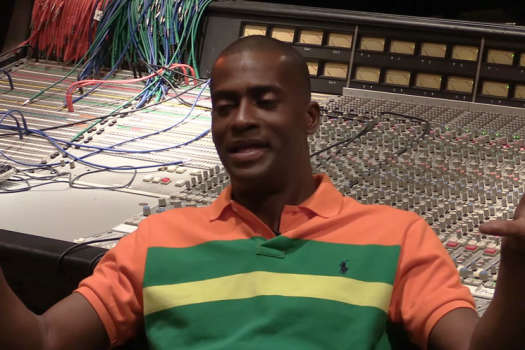Mexico-based Guatemalan director Julio Hernández Cordón's latest feature, I Promise You Anarchy, is an intriguing blend of genres and politics. In part, it borrows from Hernández Cordón's experience in documentary filmmaking, having a gritty sense of realism, while also encompassing an amalgam of narrative tropes that detail the coming-of-age paradigm within a template that's both a queer love story and a political crime thriller.
Utilizing non-professional actors found on social media, Anarchy initially depicts the friendship between two skateboarders — Miguel (Diego Calva), a middle-class teen slumming it with Johnny (Eduardo Martinez), the lower class, glue-sniffing son of his family's maid — who also casually fool around when Johnny isn't with his mopey girlfriend Adri (Shvasti Calderón). Johnny, a bisexual rebel with ties to the criminal underworld, is representative of the forbidden desires of the middle class, particularly those of queer desire in a predominantly Catholic society, which indirectly frames I Promise You Anarchy as a heteronormative admonition.
Once these characters and their dynamics are established — these are boys playing with the idea of criminality despite their own naiveté and sweet-natured romance — the instigator of conflict is introduced: the black market blood trade. What's important about this tragic plot trigger is that the preceding relationship dynamics ultimately propel the story's trajectory. Miguel is obviously infatuated with Johnny, which is something that's exploited by the more street-smart boy. He's the sexual aggressor here — the "top" — and he's also quick to manipulate the slight emotional imbalance in the relationship whenever fears of class system differences or the potential exposure of their clandestine sexual relationship arise. This is what makes Miguel's descent into criminal barter ultimately tragic: it's an indicator of love as a destructive, problematic force.
The boys excitedly discuss the relative ease of making quick money for selling blood, but also acknowledge the reality of who is buying it and to what end. When a need arises for mass quantities of blood, they're quick to respond, bringing in acquaintances throughout the neighbourhood to make a bit of money for a quick "milking."
Hernández Cordón's loose yet kinetic style (but still deliberate: pay attention to the framing of Miguel when he's placed in an emotionally denigrating situation) removes the safety net of cinematic familiarity. There are no broad gags or stylistic whims to suggest that these events will be contained and conclude with just the threat of danger. I Promise You Anarchy is open to all possibilities, escaping the forward momentum only to linger on meaningful moments, such as Johnny skateboarding in his underwear.
This lack of comfort creates a sense of palpable anxiety. We understand that these boys are getting in over their heads, but their false bravado and sense of abandon, in both physical desire — that they don't want Johnny's blood because of potential STD infection isn't just a coincidence — and criminal enterprise, is obviously destined for doom. Resultantly, the outcome of this pseudo-realist noir film isn't surprising, but the degree to which things plummet down the rabbit hole is still quite disturbing.
While this leveraging of genres to comment on two different political issues — homosexuality in Central America and the influence and allure of the criminal underworld — is quite clever and effective, the somewhat outdated presentation of gay characters as tragic figures, punished for their own indulgence, isn't particularly progressive. Granted, Hernández Cordón isn't trying to vilify his characters — he's obviously on side — but a sense of Catholic guilt looms over this story throughout, which could have been exploited through imagery if there had been some self-consciousness about this socially imposed self-hatred.
Still, despite the occasionally ineffective narrative detour and the mixed effect of hiring unprofessional actors — there's authenticity in the observation but awkwardness in the scripted scenes — there's a sober sensibility to I Promise You Anarchy that proves effective and memorable. Amidst the imperfection is an incisive notion of honesty that's both politically conscious and politically irreverent, which is a particularly odd blend.
(Latido Films)Utilizing non-professional actors found on social media, Anarchy initially depicts the friendship between two skateboarders — Miguel (Diego Calva), a middle-class teen slumming it with Johnny (Eduardo Martinez), the lower class, glue-sniffing son of his family's maid — who also casually fool around when Johnny isn't with his mopey girlfriend Adri (Shvasti Calderón). Johnny, a bisexual rebel with ties to the criminal underworld, is representative of the forbidden desires of the middle class, particularly those of queer desire in a predominantly Catholic society, which indirectly frames I Promise You Anarchy as a heteronormative admonition.
Once these characters and their dynamics are established — these are boys playing with the idea of criminality despite their own naiveté and sweet-natured romance — the instigator of conflict is introduced: the black market blood trade. What's important about this tragic plot trigger is that the preceding relationship dynamics ultimately propel the story's trajectory. Miguel is obviously infatuated with Johnny, which is something that's exploited by the more street-smart boy. He's the sexual aggressor here — the "top" — and he's also quick to manipulate the slight emotional imbalance in the relationship whenever fears of class system differences or the potential exposure of their clandestine sexual relationship arise. This is what makes Miguel's descent into criminal barter ultimately tragic: it's an indicator of love as a destructive, problematic force.
The boys excitedly discuss the relative ease of making quick money for selling blood, but also acknowledge the reality of who is buying it and to what end. When a need arises for mass quantities of blood, they're quick to respond, bringing in acquaintances throughout the neighbourhood to make a bit of money for a quick "milking."
Hernández Cordón's loose yet kinetic style (but still deliberate: pay attention to the framing of Miguel when he's placed in an emotionally denigrating situation) removes the safety net of cinematic familiarity. There are no broad gags or stylistic whims to suggest that these events will be contained and conclude with just the threat of danger. I Promise You Anarchy is open to all possibilities, escaping the forward momentum only to linger on meaningful moments, such as Johnny skateboarding in his underwear.
This lack of comfort creates a sense of palpable anxiety. We understand that these boys are getting in over their heads, but their false bravado and sense of abandon, in both physical desire — that they don't want Johnny's blood because of potential STD infection isn't just a coincidence — and criminal enterprise, is obviously destined for doom. Resultantly, the outcome of this pseudo-realist noir film isn't surprising, but the degree to which things plummet down the rabbit hole is still quite disturbing.
While this leveraging of genres to comment on two different political issues — homosexuality in Central America and the influence and allure of the criminal underworld — is quite clever and effective, the somewhat outdated presentation of gay characters as tragic figures, punished for their own indulgence, isn't particularly progressive. Granted, Hernández Cordón isn't trying to vilify his characters — he's obviously on side — but a sense of Catholic guilt looms over this story throughout, which could have been exploited through imagery if there had been some self-consciousness about this socially imposed self-hatred.
Still, despite the occasionally ineffective narrative detour and the mixed effect of hiring unprofessional actors — there's authenticity in the observation but awkwardness in the scripted scenes — there's a sober sensibility to I Promise You Anarchy that proves effective and memorable. Amidst the imperfection is an incisive notion of honesty that's both politically conscious and politically irreverent, which is a particularly odd blend.




